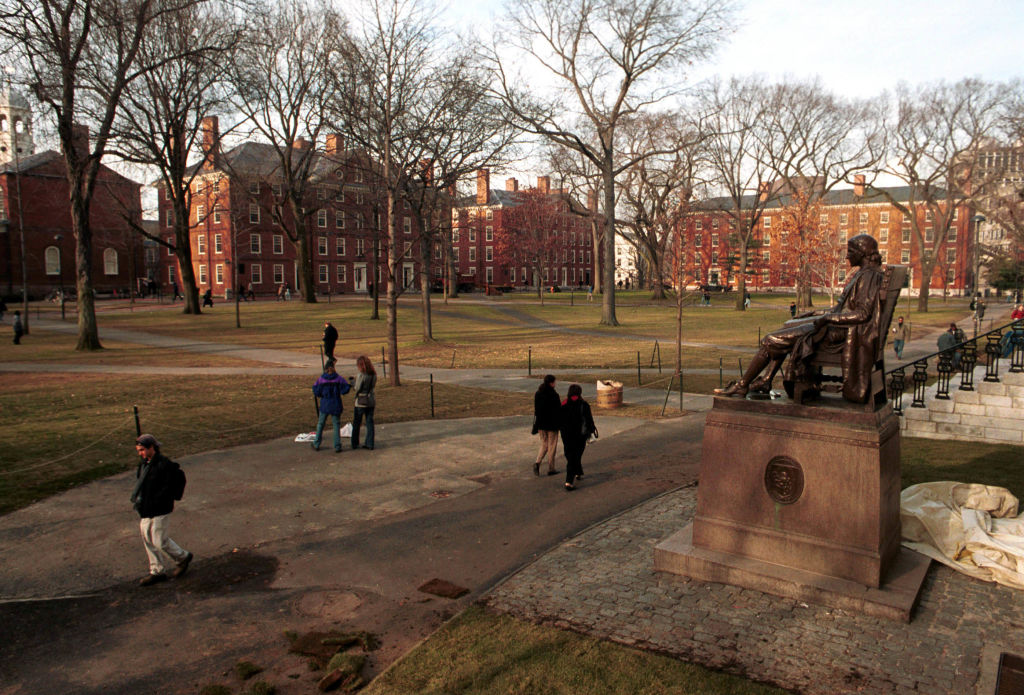Harvard Proposes HBCU Partnerships To Atone For Slavery
People walk past the John Harvard statue at Harvard University’s main campus on December 19, 2000, in Cambridge, Massachusetts. | Source: Darren McCollester / Getty
Historically Black colleges and universities (HBCUs) across the country could begin an intriguing partnership with one of the most renowned universities in the world.
Harvard University announced this week its plan to spend $100 million to study and atone for its connection with slavery. Harvard President Lawrence Bacow announced the plans for the school to support the descendants of enslaved individuals who contributed to the success of the university.
Now, the nation’s oldest and wealthiest college with an endowment of more than $50 billion said it will work with HBCUs as well as implement other strategies to try to make amends for its involvement in slavery.
Along with the announcement about the $100 million investment, Harvard also released a report that highlighted the different ways Harvard benefited from slavery and racial inequality.
According to the report, Harvard officials enslaved more than 70 Black and Native American people from the school’s founding in 1636 to 1783. The report also said that this number was “almost certainly an undercount.”
“Enslaved men and women served Harvard presidents and professors and fed and cared for Harvard students,” researchers found. “Moreover, throughout this period and well into the 19th century, the University and its donors benefited from extensive financial ties to slavery.”
Leaders plan to use the new funding to bring HBCU scholars and faculty to the Ivy League school for up to a year at a time.
“In light of the invaluable role of HBCUs in the educational landscape and the persistent underfunding of these colleges, we believe the University should develop enduring partnerships with HBCUs. We suggest that it do so through the expansion of existing collaborations between Harvard’s schools and research-focused HBCUs,” according to the recommendations from the report.
The gravestone of Cicely in the Old Burial Ground in Cambridge, Massachusetts, on April 26, 2022. Cicely was an enslaved girl who died aged 13. While her stone bears just her given name, the full name of her captor – the Rev. M. William Brattle – is chiseled on her stone. Harvard University’s ties to slavery are being explored. | Source: Boston Globe / Getty
“To promote enriching and long-lasting bonds between the universities, we recommend that Harvard encourage and fund summer, semester, or yearlong visiting appointments to Harvard by interested faculty from HBCU partner institutions and similar visiting appointments by Harvard faculty to HBCU partners. We also recommend that the University encourage and subsidize summer, semester, or yearlong visits to Harvard by interested students who are juniors at HBCU partner institutions and by interested Harvard students in their junior years to HBCU partners.”
The announcement has sparked an interesting conversation among many in the HBCU community and academic space as a whole. While it is admirable that a school as prestigious as Harvard is acknowledging its racial wrongdoings and trying to make up for them, a legitimate question can be asked about if this $100 million commitment is enough from a school that is sitting on a $50 billion endowment?
Also, should HBCUs be so quick to participate in a partnership that could be seen by many as a glorified PR stunt? And at what length should HBCUs go to give their students a chance at an opportunity?
These are complicated questions that many HBCU decision-makers will grapple with and others in the HBCU community will continue to debate. And as more predominantly white institutions come to grasp the racial harm they have committed, more HBCUs will likely be at the center of more partnerships moving forward.
SEE ALSO:
HBCUs Are Establishing Marijuana Programs To Fight Whitewashing Of Legal Cannabis Industry

